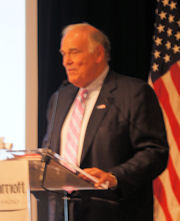by James A. Bacon
The message came through loud and clear at a transportation conference hosted yesterday by Chambers of Commerce from Hampton Roads, Richmond and Fairfax County: Virginia needs more roads for transportation. What no one appears to have resolved yet is how to pay for those improvements or how to prioritize the spending.
“People say, ‘I don’t want you to raise my taxes.’ But there’s another tax — the tax of doing nothing,” said Ed Rendell, a former Pennsylvania governor who now co-chairs Building America’s Future, a coalition of elected officials pushing for more infrastructure investment. Settling for the status quo means settling for more traffic congestion, decreased productivity, diminished quality of life, loss of tourism and more pollution, he told a crowd of roughly 150 businessmen and elected officials from Virginia’s urban crescent.
Right now Virginia has $14 billion of transportation projects under construction or in procurement, and there will be more by the end of the year, said Secretary of Transportation Sean Connaughton. But much of that comes from borrowing heavily and leveraging state dollars through public-private partnerships. Once the state runs through that project pipeline, construction funds will become very scarce very fast. The motor fuels tax, the number one source of transportation dollars, is eroding, Connaughton said. Not only has inflation whittled down the purchasing power of the tax by roughly 50 percent since 1986, he said, the gas tax collected per vehicle mile traveled declined 6.5% just last year alone.
Dwight Farmer, executive director of the Hampton Roads Transportation Planning Organization, summed up Virginia’s transportation funding future this way: Virginia will run out of money for state construction projects by 2017. Every dollar of state revenue will go to paying off debt, supporting maintenance and operations, and matching federal grants. There won’t even be enough money available to chip in the state’s 20 percent matching share to obtain the full allocation of federal funds.
Without more money, according to data generated by an ad hoc coalition of “mayor and chairs” from Virginia’s urban crescent, the net present value of congestion costs will amount to $77 billion through 2040. Most attendees, roughly half of whom were from the Virginia business community, bought into the proposition that insufficient transportation funding threatens the economic competitiveness of the state’s urban crescent. The Northern Virginia, Hampton Roads and Richmond regions account for 24% of the state’s land mass, 68% of its population and 79% of its economy.
While the region’s business community appears to have lined up behind their political leaders, there was less unanimity about where the money should come from. In a series of electronic polls attendees signaled strong support for increasing the motor fuels tax, strong opposition to hiking property taxes, and diverging opinions on whether to tap the income and sales taxes. No one spelled out which projects would receive priority funding. And no consideration was given to examining alternatives such as reforming zoning and land use policies, investing in “smart roads” to increase the capacity of existing roads, using time-of-day pricing to allocate peak traffic capacity, or shifting funding from highways to rail. The issue was framed exclusively as one of insufficient revenue.
“We are going to run out of money,” said Sen. John C. Watkins, R-Midlothian. The state’s run-up of debt — from $4.5 billion in 2000 to $12.5 billion today– is a “stopgap.” Tolls have their place but only on new facilities, not for assets that have been bought and paid for, he said in the biggest applause line of the conference. Slapping tolls on Interstate 95, as the McDonnell administration has proposed doing, will generate $40 only million a year — equivalent to adding one penny on the gas tax.
Watkins said he has proposed indexing the motor fuels tax for inflation, but his bills have gone nowhere. He also acknowledged that the gasoline tax will be decreasingly adequate over time as vehicles get better mileage and tax revenues continue to fall. A longer-term solution, he said, is a Vehicle Miles Traveled (VMT) tax.
Sen. George L. Barker, D-Alexandria, reiterated the need for more revenue but noted significant hurdles for the VMT tax such as “big brother” privacy issues entailed with tracking cars’ movements and the difficult of coordinating between states. “We can’t set up border patrols at the West Virginia state line.” Instituting a VMT tax probably would require federal involvement, he said.
The only hint that Virginia’s transportation woes may stem from something other than insufficient funding came from Del. John O’Bannon, R-Henrico. Virginia has the third largest DOT (Department of Transportation) in the country, and it’s one of only four state DOTs to take responsibility for secondary roads. “We must look at the issue of the state taking on every lane-mile that comes along,” he said. Smart Growth critics of state transportation policy have argued similarly, noting that local governments make land use decisions that generate traffic while the state is held responsible for building the roads to carry that traffic.
Rendell closed the conference with a pep talk. “Public officials are scared,” he said. “They think the public won’t support raising taxes.” But as governor of Pennsylvania, he proved those fears wrong. He raised taxes yet managed to win re-election. “The tax of inaction is something we’ve got to explain.”



